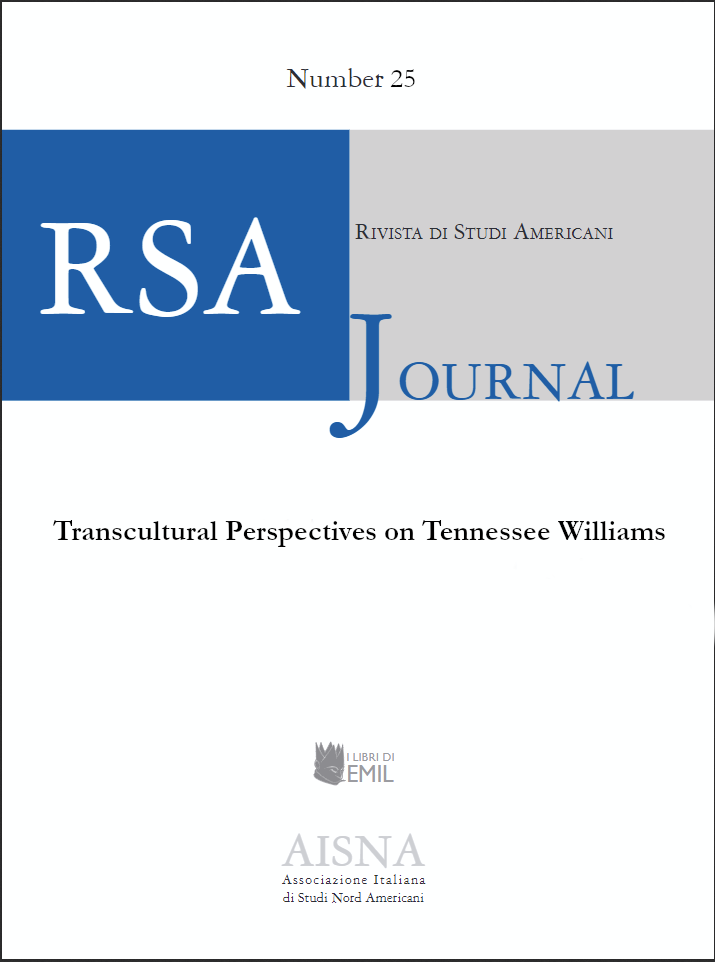“This Country, Where Many Things Are strange and Hard to Understand”
Booker T. Washington in Sicily
DOI:
https://doi.org/10.13135/1592-4467/8616Parole chiave:
traditionalism, religion, lack of morality, SicilyAbstract
The Man Farthest Down (1912), which narrates the 1910 visit to Europe of the prominent African-American leader Booker T. Washington, includes an important section on Sicily. The book focuses on social conditions in Europe and within this framework Sicily and the Sicilians firstly appear as a negative counter-image of the African Americans in the United States South. The island’s poverty results from the traditionalism of its population, its instrumental religion and lack of morality. Washington refuses, however, to racialize this negative image, and at a second level of his narrative he deploys Sicily as a case to deconstruct stereotyped representations, while comparisons between Sicily and the United States also provide covert critiques of social conditions, especially of African Americans, in the latter country. At a third level, Washington also frequently provides positive images of Sicilians. These images reflect his genuine understanding for Sicilians as a downtrodden group, and his appreciation of their human qualities. This layered description undoubtedly influences Washington’s analysis of the causes of poverty in Sicily. The traditionalism and alleged lack of morality of its population, the causes originally outlined, at a second level become consequences of the neglect and oppression of the Sicilians. He remains, however, surprisingly silent about possible remedies for Sicily’s problems, and ignores in fact movements for change that were effectively occurring on the island. We can assume, however, that his moderate programme in the United States, proposing uplift of the African American community through education and self-help, made it difficult to endorse radical changes in an island whose conditions he had constantly compared to the American South.
##submission.downloads##
Pubblicato
Fascicolo
Sezione
Licenza
Avviso sul Copyright
RSAJournal applica una licenza CC BY-NC-ND a tutti i suoi contributi. Questa licenza consente agli utenti di copiare e distribuire il materiale in qualsiasi supporto o formato solo in forma non adattata, per scopi non commerciali e a condizione che venga esplicitato/a l'autore/autrice dell'opera. CC BY-NC-ND include i seguenti elementi:
- BY: L'autore deve essere riconosciuto come tale.
- NC: Sono consentiti solo utilizzi non commerciali dell'opera.
- ND: Non sono consentite opere derivate o adattamenti dell'opera.
Gli autori che pubblicano con questa rivista accettano i seguenti termini:
- Gli autori conservano il copyright e tutti i diritti di pubblicazione per i loro contributi alla rivista.
- Gli autori concedono alla rivista il diritto di prima pubblicazione in base alla licenza internazionale Creative Commons Attribution-NonCommercial-NoDerivatives 4.0, che consente ad altri di condividere l'opera non modificata per scopi non commerciali a condizione che venga esplicitato/a l'autore/autrice dell'opera e la sede di pubblicazione iniziale (questa rivista).
- Gli autori sono in grado di stipulare accordi contrattuali separati e aggiuntivi per la distribuzione non esclusiva della versione pubblicata dalla rivista (ad esempio, per inserirla in una repository istituzionale o pubblicarla in un libro), con l'indicazione che il contributo è stato precedentemente pubblicato in RSAJournal.




